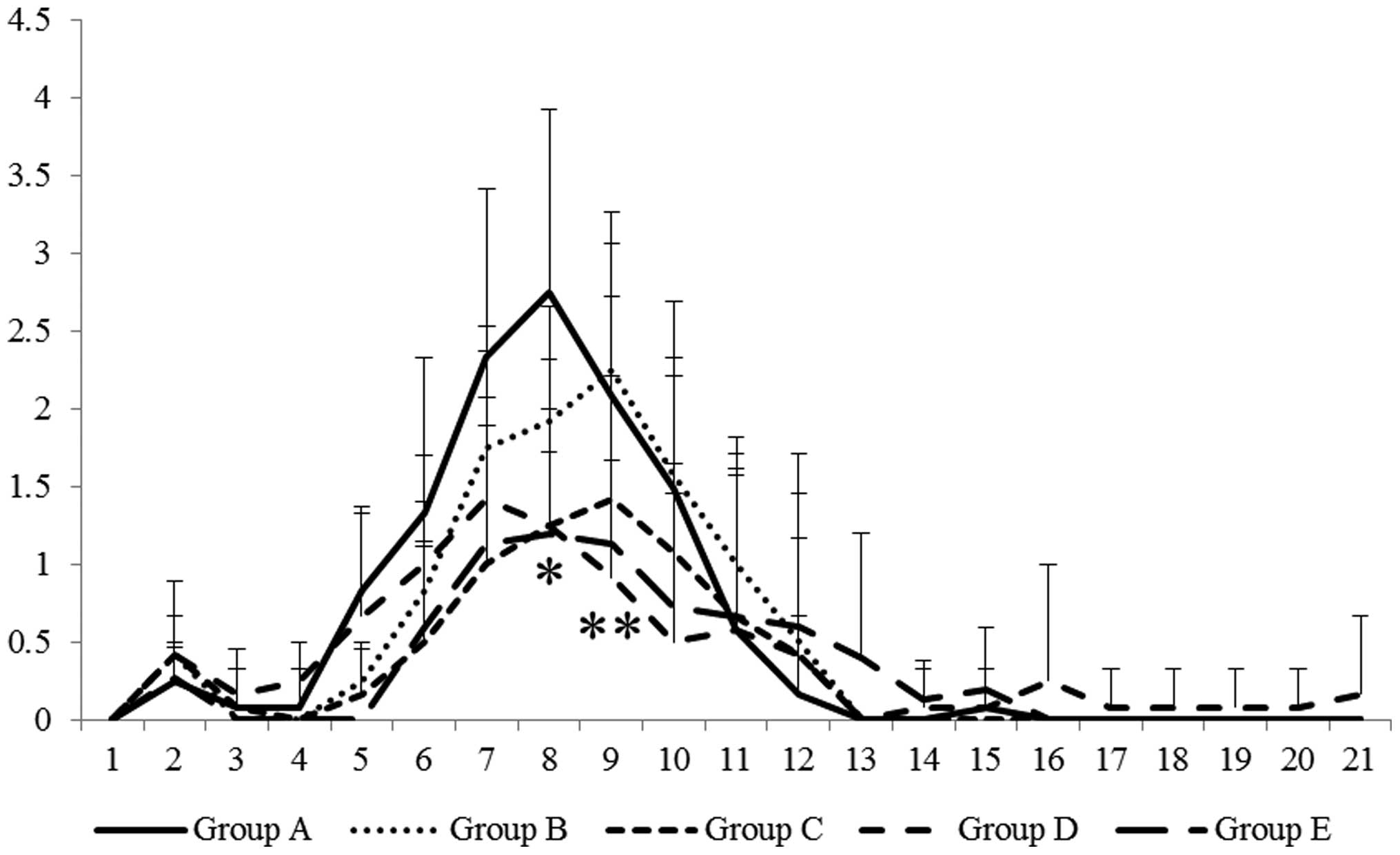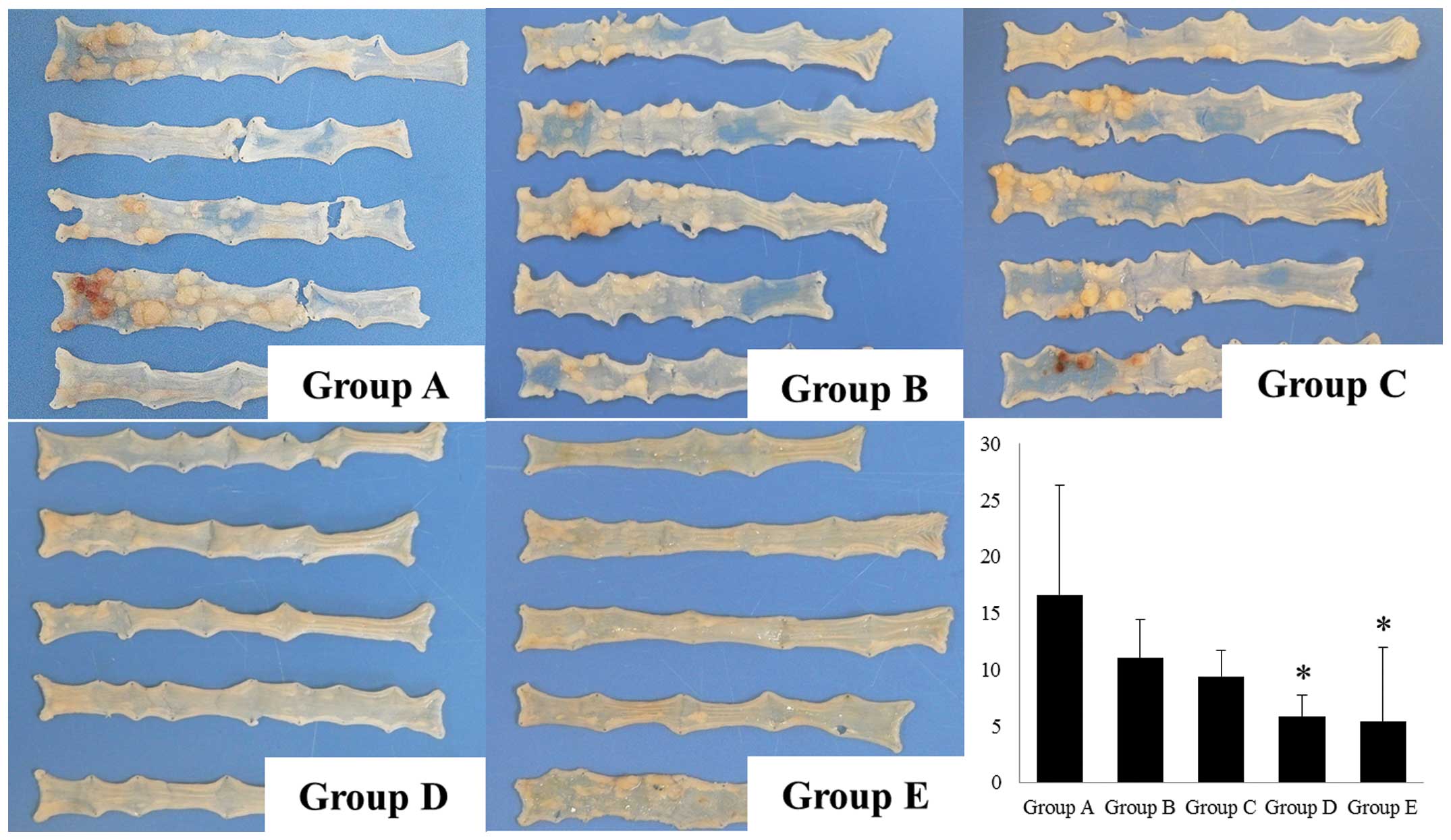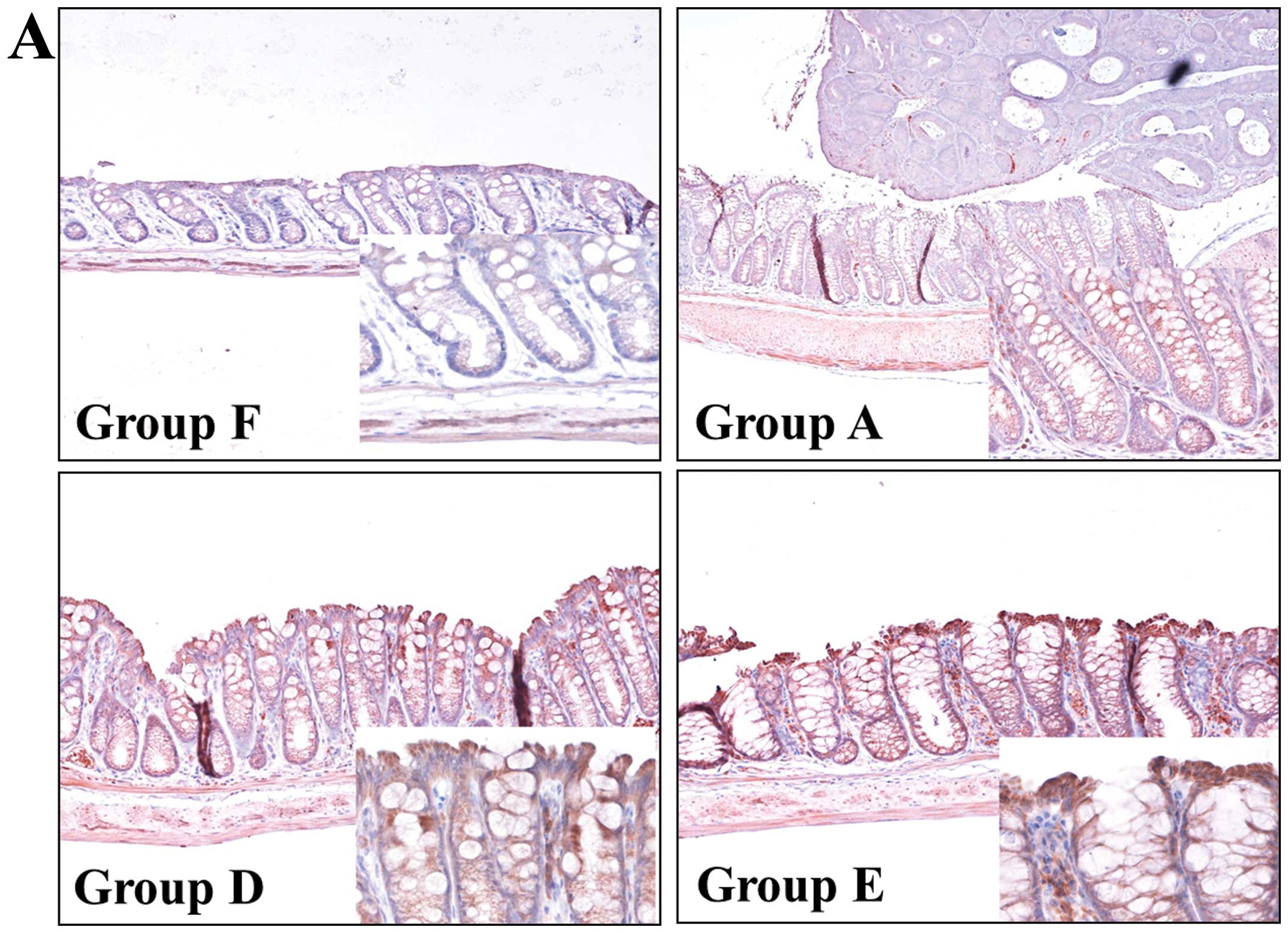|
1
|
Watanabe T, Konishi T, Kishimoto J, Kotake
K, Muto T and Sugihara K: Japanese Society for Cancer of the Colon
and Rectum: Ulcerative colitis-associated colorectal cancer shows a
poorer survival than sporadic colorectal cancer: a nationwide
Japanese study. Inflamm Bowel Dis. 3:802–808. 2011. View Article : Google Scholar
|
|
2
|
Lyakhovich A and Gasche C: Systematic
review: molecular chemoprevention of colorectal malignancy by
mesalazine. Aliment Pharmacol Ther. 31:202–209. 2010.
|
|
3
|
Herfarth H: The role of chemoprevention of
colorectal cancer with 5-aminosalicylates in ulcerative colitis.
Dig Dis. 30(Suppl 2): 55–59. 2012. View Article : Google Scholar : PubMed/NCBI
|
|
4
|
Lopez A and Peyrin-Biroulet L:
5-Aminosalicylic acid and chemoprevention: does it work? Dig Dis.
31:248–253. 2013. View Article : Google Scholar : PubMed/NCBI
|
|
5
|
Ekbom A, Helmick C, Zack M and Adami HO:
Ulcerative colitis and colorectal cancer. A population-based study.
N Engl J Med. 323:1228–1233. 1990. View Article : Google Scholar : PubMed/NCBI
|
|
6
|
Mizushima T: RETRACTED: protective role of
HSP70 against various gastrointestinal diseases. Curr Opin
Pharmacol. 19:1–5. 2014. View Article : Google Scholar
|
|
7
|
Hauser GJ, Dayao EK, Wasserloos K, Pitt BR
and Wong HR: HSP induction inhibits iNOS mRNA expression and
attenuates hypotension in endotoxin-challenged rats. Am J Physiol.
271:H2529–H2535. 1996.PubMed/NCBI
|
|
8
|
Chan JY, Ou CC, Wang LL and Chan SH: Heat
shock protein 70 confers cardiovascular protection during
endotoxemia via inhibition of nuclear factor-κB activation and
inducible nitric oxide synthase expression in the rostral
ventrolateral medulla. Circulation. 110:3560–3566. 2004. View Article : Google Scholar : PubMed/NCBI
|
|
9
|
Tao Y, Hart J, Lichtenstein L, Joseph LJ,
Ciancio MJ, Hu S, Chang EB and Bissonnette M: Inducible heat shock
protein 70 prevents multifocal flat dysplastic lesions and invasive
tumors in an inflammatory model of colon cancer. Carcinogenesis.
30:175–182. 2009. View Article : Google Scholar :
|
|
10
|
Ohkawara T, Nishihira J, Takeda H,
Miyashita K, Kato K, Kato M, Sugiyama T and Asaka M:
Geranylgeranylacetone protects mice from dextran sulfate
sodium-induced colitis. Scand J Gastroenterol. 40:1049–1057. 2005.
View Article : Google Scholar : PubMed/NCBI
|
|
11
|
Ohkawara T, Nishihira J, Takeda H,
Katsurada T, Kato K, Yoshiki T, Sugiyama T and Asaka M: Protective
effect of geranylgeranylacetone on trinitrobenzene sulfonic
acid-induced colitis in mice. Int J Mol Med. 17:229–234.
2006.PubMed/NCBI
|
|
12
|
Inoue T, Murano M, Yoda Y, et al:
R-etodolac induces E-cadherin and suppresses colitis-related mouse
colon tumorigenesis. Oncol Rep. 24:1487–1492. 2010.PubMed/NCBI
|
|
13
|
Inoue T, Murano M, Abe Y, et al:
Therapeutic effect of nimesulide on colorectal carcinogenesis in
experimental murine ulcerative colitis. J Gastroenterol Hepatol.
22:1474–1481. 2007. View Article : Google Scholar : PubMed/NCBI
|
|
14
|
Wedemeyer J and Galli SJ: Decreased
susceptibility of mast cell-deficient
KitW/KitW-v mice to the development of
1,2-dimeth-ylhydrazine-induced intestinal tumors. Lab Invest.
85:388–396. 2005. View Article : Google Scholar : PubMed/NCBI
|
|
15
|
Riddell RH, Goldman H, Ransohof DF, et al:
Dysplasia in inflammatory bowel disease: standardized
classification with provisional clinical application. Human Pathol.
14:931–968. 1983. View Article : Google Scholar
|
|
16
|
Murthy SN, Cooper HS, Shim H, Shah RS,
Ibrahim SA and Sedergran DJ: Treatment of dextran sulfate
sodium-induced murine colitis by intracolonic cyclosporine. Dig Dis
Sci. 38:1722–1734. 1993. View Article : Google Scholar : PubMed/NCBI
|
|
17
|
Suemasu S, Tanaka K, Namba T, et al: A
role for HSP70 in protecting against indomethacin-induced gastric
lesions. J Biol Chem. 284:19705–19715. 2009. View Article : Google Scholar : PubMed/NCBI
|
|
18
|
Asano T, Tanaka K, Yamakawa N, Adachi H,
Sobue G, Goto H, Takeuchi K and Mizushima T: HSP70 confers
protection against indomethacin-induced lesions of the small
intestine. J Pharmacol Exp Ther. 330:458–467. 2009. View Article : Google Scholar : PubMed/NCBI
|
|
19
|
Umegaki E, Kuramoto T, Kojima Y, Nouda S,
Ishida K, Takeuchi T, Inoue T, Tokioka S and Higuchi K:
Geranylgeranylacetone, a gastromucoprotective drug, protects
against NSAID-induced esophageal, gastroduodenal and small
intestinal mucosal injury in healthy subjects: a prospective
randomized study involving a comparison with famotidine. Intern
Med. 53:283–290. 2014. View Article : Google Scholar : PubMed/NCBI
|
|
20
|
Yanaka A, Zhang S, Sato D, Tauchi M,
Suzuki H, Shibahara T, Matsui H, Nakahara A and Hyodo I:
Geranylgeranylacetone protects the human gastric mucosa from
diclofenac-induced injury via induction of heat shock protein 70.
Digestion. 75:148–155. 2007. View Article : Google Scholar : PubMed/NCBI
|
|
21
|
Chan AT, Ogino S and Fuchs CS: Aspirin and
the risk of colorectal cancer in relation to the expression of
COX-2. N Eng J Med. 356:2131–2142. 2007. View Article : Google Scholar
|
|
22
|
Tardieu D, Jaeg JP, Deloly A, Corpet DE,
Cadet J and Petit CR: The COX-2 inhibitor nimesulide suppresses
superoxide and 8-hydroxy-deoxyguanosine formation, and stimulates
apoptosis in mucosa during early colonic inflammation in rats.
Carcinogenesis. 21:973–976. 2000. View Article : Google Scholar : PubMed/NCBI
|
|
23
|
Forrest K, Symmons D and Foster P:
Systematic review: is ingestion of paracetamol or non-steroidal
anti-inflammatory drugs associated with exacerbations of
inflammatory bowel disease? Aliment Pharmacol Ther. 20:1035–1043.
2004. View Article : Google Scholar : PubMed/NCBI
|
|
24
|
Nishida T, Yabe Y, Fu HY, Hayashi Y, Asahi
K, Eguchi H, Tsuji S, Tsujii M, Hayashi N and Kawano S:
Geranylgeranylacetone induces cyclooxygenase-2 expression in
cultured rat gastric epithelial cells through NF-κB. Dig Dis Sci.
52:1890–1896. 2007. View Article : Google Scholar : PubMed/NCBI
|
|
25
|
Ashburn TT and Thor KB: Drug
repositioning: identifying and developing new uses for existing
drugs. Nat Rev Drug Discov. 3:673–683. 2004. View Article : Google Scholar : PubMed/NCBI
|
|
26
|
Hoshino T, Suzuki K, Matsushima T,
Yamakawa N, Suzuki T and Mizushima T: Suppression of Alzheimer’s
disease-related phenotypes by geranylgeranylacetone in mice. PLoS
One. 8:e763062013. View Article : Google Scholar
|
|
27
|
Namba T, Tanaka K, Hoshino T, Azuma A and
Mizushima T: Suppression of expression of heat shock protein 70 by
gefitinib and its contribution to pulmonary fibrosis. PLoS One.
6:e272962011. View Article : Google Scholar : PubMed/NCBI
|


















